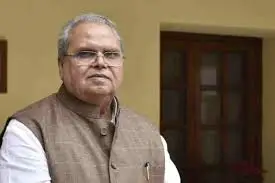Former J&K governor Satya Pal Malik among 7 named in CBI chargesheet in hydel project case

The Central Bureau of Investigation (CBI) has charged former Jammu and Kashmir Governor Satya Pal Malik and six others in a high-profile corruption case. The case involves alleged irregularities in the award of a ₹2,200 crore contract for the Kiru Hydroelectric Power Project in Kishtwar, Jammu and Kashmir.
This case has sparked widespread attention because of Malik’s earlier claims of being offered a bribe related to this very project.
What the Kiru Project Is About
The Kiru Hydroelectric Project is a major initiative on the Chenab River. It is being built by Chenab Valley Power Projects Pvt. Ltd. (CVPPPL)—a joint venture between NHPC, JKSPDC, and PTC India.
The project aims to boost energy generation in Jammu and Kashmir. However, the tendering process has raised serious concerns. According to the CBI, the board of CVPPPL had decided to go for e-tendering with a reverse auction. This method ensures fairness and competitiveness. But officials skipped this step and directly awarded the contract to Patel Engineering Ltd.
Who Has Been Named?
The CBI chargesheet includes:
- Satya Pal Malik, former Governor of J&K
- His former aides Virendra Rana and Kanwar Singh Rana
- M S Babu, Managing Director of CVPPPL
- Directors M K Mittal and Arun Kumar Mishra
- Patel Engineering Ltd., the company that received the contract
Investigators claim these individuals manipulated the process to benefit the construction firm.
How the Case Started
In 2021, Satya Pal Malik gave a startling interview. He revealed that someone had offered him ₹300 crore in bribes to approve two files. One of those files concerned the Kiru Hydel Project. The other was linked to an insurance deal.
Following these revelations, the CBI launched an inquiry. They later expanded it into a full investigation, leading to raids and evidence collection.
Malik’s Reaction
Satya Pal Malik has denied all wrongdoing. After news of the chargesheet broke, he posted a message from a hospital bed. “I am not well and unable to speak,” he wrote on social media. He had earlier stated that instead of punishing the corrupt, authorities were targeting the whistleblower.
Malik also said that the CBI should have investigated those who offered the bribe. Instead, he claims, they raided his home and questioned him.
Political Fallout
This case has political overtones. Malik has often spoken against central government policies. He also criticized how the Pulwama terror attack was handled. His statements made him a controversial figure.
Now, opposition leaders see the charges as a form of political retaliation. They argue that the government is punishing him for speaking out. Meanwhile, government sources insist that the law applies to everyone, regardless of their past roles.
Legal Consequences
Legal experts say that the charges could lead to serious penalties if the court finds the accused guilty. The charges fall under several sections of the Indian Penal Code and the Prevention of Corruption Act.
The court will now review the chargesheet and may summon the accused for trial. The CBI might also continue digging deeper into financial records and communications linked to the project.
The Role of CVPPPL Under Scrutiny
The spotlight is also on CVPPPL and its decision-making. Why did the board’s recommendation for reverse auctioning get ignored? Who authorized the final decision?
These questions are key to understanding whether this was a one-time lapse or part of a broader pattern of misconduct.
What This Case Reveals
This case reveals the cracks in India’s infrastructure approval system. Large projects involving public funds must follow strict rules. Any shortcuts or favoritism harm not just the economy but also public trust.
The Kiru project was supposed to be a model of progress for Jammu and Kashmir. Instead, it has become a symbol of how corruption can derail development.
Conclusion
The CBI’s charges against Satya Pal Malik and others mark a turning point in this case. As the legal battle unfolds, all eyes will be on the courts.
Will this case lead to justice? Or will it turn into yet another political controversy? Either way, the nation deserves clear answers and accountability.






